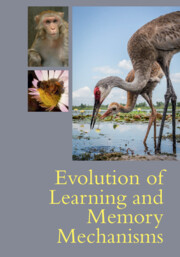Book contents
- Evolution of Learning and Memory Mechanisms
- Evolution of Learning and Memory Mechanisms
- Copyright page
- Contents
- Figures
- Tables
- Contributors
- Preface
- Introduction
- Part I Evolution of Learning Processes
- 1 Learning and Memory in the Nematode Caenorhabditis elegans
- 2 Adaptive Evolution of Learning and Memory in a Model Lineage
- 3 Learning in Insects: Perspectives and Possibilities
- 4 Experimental Evolution and Mechanisms for Prepared Learning
- 5 Evolutionary Processes Shaping Learning Ability in Insects
- 6 Brain and Spatial Cognition in Amphibians
- 7 Pavlovian Conditioning, Survival, and Reproductive Success
- 8 Compensatory Responses to Wildlife Control
- 9 Relational Memory Functions of the Hippocampal Pallium in Teleost Fish
- 10 Mechanisms Underlying Absolute and Relative Reward Value in Vertebrates
- 11 The Optimality of “Suboptimal” Choice
- 12 A Behavior Systems Framework
- 13 Dissociable Learning Processes
- 14 Social Learning Strategies
- 15 How Learning Affects Evolution
- Part II Evolution of Memory Processes
- Index
- References
13 - Dissociable Learning Processes
A Comparative Perspective
from Part I - Evolution of Learning Processes
Published online by Cambridge University Press: 26 May 2022
- Evolution of Learning and Memory Mechanisms
- Evolution of Learning and Memory Mechanisms
- Copyright page
- Contents
- Figures
- Tables
- Contributors
- Preface
- Introduction
- Part I Evolution of Learning Processes
- 1 Learning and Memory in the Nematode Caenorhabditis elegans
- 2 Adaptive Evolution of Learning and Memory in a Model Lineage
- 3 Learning in Insects: Perspectives and Possibilities
- 4 Experimental Evolution and Mechanisms for Prepared Learning
- 5 Evolutionary Processes Shaping Learning Ability in Insects
- 6 Brain and Spatial Cognition in Amphibians
- 7 Pavlovian Conditioning, Survival, and Reproductive Success
- 8 Compensatory Responses to Wildlife Control
- 9 Relational Memory Functions of the Hippocampal Pallium in Teleost Fish
- 10 Mechanisms Underlying Absolute and Relative Reward Value in Vertebrates
- 11 The Optimality of “Suboptimal” Choice
- 12 A Behavior Systems Framework
- 13 Dissociable Learning Processes
- 14 Social Learning Strategies
- 15 How Learning Affects Evolution
- Part II Evolution of Memory Processes
- Index
- References
Summary
It is a traditional hope of comparative psychology that animal minds might be unitary, parsimonious, associative. In contrast, cognitive researchers acknowledge multiple learning systems, including humans’ capacity for explicit hypothesis testing and rule learning. The authors describe new paradigms that may dissociate the explicit from the associative and demonstrate animals’ explicit capabilities. These paradigms include matched tasks that foster explicit or associative category learning, and paradigms that disable crucial components of associative learning. Given this disabling, animals may adopt instead an alternative, more explicit learning system. The authors review this area, including research on humans, monkeys, rats, and pigeons. They also consider the evolutionary and fitness factors that might favor the development of complementary associative and explicit learning systems.
Keywords
Information
- Type
- Chapter
- Information
- Evolution of Learning and Memory Mechanisms , pp. 227 - 246Publisher: Cambridge University PressPrint publication year: 2022
